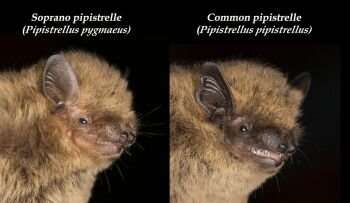Going off the rails: Research reveals ecological impact of rail transport on UK bat species

New research from the University of Sussex has revealed the ecological impact of rail transport on bats in the UK, throwing light on a previously unstudied area.
Globally, rail traffic is predicted to increase by a third by 2050. In the UK, new railways such as HS2 and Cross-Rail are being constructed, and there is increasing use of the existing network for both passenger and freight transport. Whilst rail offers significant environmental benefits compared with other transport, there has been little research into its impact on wildlife. Existing studies have tended to focus on fatalities caused by train collisions rather than non-lethal effects caused by sound and light pollution.
But in a new paper published in Scientific Reports, Professor Fiona Mathews and Dr. Paul Jerem from the University of Sussex show that the activity of two UK bat species is significantly disrupted by passing trains.
Fiona Mathews, Professor of Environmental Biology at the University of Sussex, said that "railway verges can be attractive environments for bats. The lines often provide 'green corridors' through otherwise inhospitable environments, such as urban centers or intensively managed agricultural land, and activity of bats is generally high along them. However, railway lines are becoming increasingly busy at night."
"Our study reveals that this rail traffic is likely to make these areas unsuitable for up to two thirds of the night."
Using ultrasonic detectors at 12 wooded rail-side sites in southern England, the researchers monitored the common and soprano pipistrelle bats, which are abundant in Europe and both frequently use habitats associated with transport infrastructure.
They found that the activity of these two species fell by more than 30-50% each time a train passed, and it took at least two minutes for activity to recover. The more frequently the trains passed, the greater the total amount of disturbance caused.
Prof Mathews and Dr. Jerem suspect the bats are showing avoidance of the sound created by the trains—as well as the physical object of the train itself.
Dr. Jerem, now at Vrije Universiteit Amsterdam, said that "taking evasive action every time a train passes may be energetically expensive, and reduce feeding opportunities, potentially disadvantaging bats using rail-side habitats".
The occasional passing train is unlikely to present a problem for bat conservation. However, on many railway lines, the disturbance now occurs every three or four minutes. Every time a train passes, the bats have to take aversive action for two minutes, at huge energetic cost.
Globally, bats play an essential role in pest control, pollinating plants and dispersing seeds. In the UK, they frequently interact with transport networks due their broad distribution.
The researchers are now calling for greater consideration of wildlife when it comes to public transport.
Prof Mathews added that "railways are one of the most efficient ways of transporting people and freight, and with the climate crisis, people, as well as companies who need to transport goods overnight, will be turning to public transport with one eye on the planet."
"But at the moment, no consideration is given to the ecological impacts of increased railway traffic. We'd like to see this change and appropriate mitigation could be as simple as setting aside larger buffer areas adjacent to railways, reducing the impact on bats—and possibly many other species."
More information: Paul Jerem et al, Passing rail traffic reduces bat activity, Scientific Reports (2021). DOI: 10.1038/s41598-021-00101-3
Journal information: Scientific Reports
Provided by University of Sussex





















